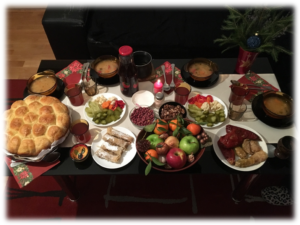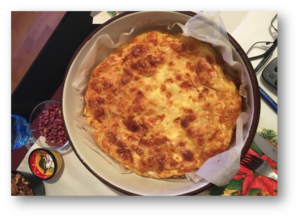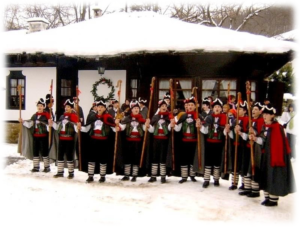What we celebrate and why: A Bulgarian-Orthodox View of Christmas
The last Christmas and New Year’s festivities were clearly one of the most extraordinary ones in recent history. Countless families were forced to limit their usual gatherings and celebrate physically apart due to coronavirus and thus had to search for alternative forms of celebration, e.g. by relying on digital tools. What’s more, many churches drastically limited the number of worshippers in their Christmas sermons, if they delivered them in person at all. In short, we witnessed extraordinary holidays in an extraordinary time.
The same can be stated for our participant in the 2020/21 programme year, Rangel Trifonov. As opposed to recent years, Rangel was not able to travel to Bulgaria from the Cologne area in Germany, where he is currently pursuing his PhD in German Literature, to celebrate Christmas with his loved ones. This notwithstanding, he has fortunately agreed to share insights into his personal Bulgarian-Orthodox Christmas and New Year’s traditions with us! We sincerely hope that he will be able to celebrate next Christmas and New Year’s with his loved ones in Bulgaria. Enjoy the read and a very happy and healthy start new year from the Dialogueperspectives-team in Berlin!
If you have any questions or remarks, as always, do not hesitate to get in touch.
Christmas in the Christian-Orthodox Tradition. The Case Study of Bulgaria
The birth of Jesus Christ, also known as the Feast of the Nativity, Christmas (Bulg. „Koleda“), is one of the most significant holidays in Christianity.
Christmas and New Year are the most popular and famous holidays in the Orthodox world. Christmas can be described as a family celebration. Traditionally, there are a series of official holidays during this period, which last until the end of January, when very popular name days are celebrated. The highlight of the numerous holidays is Christmas and New Year.
The Christmas celebrations start on the day of St. Ignatius of Antioch
The day of St. Ignatius is celebrated on December 20th, and from then until the New Year, Orthodox Christians in Bulgaria focus on preparing for the upcoming holidays. On this day, it is considered as very important what kind of person will enter the house – good or indecent, hardworking or lazy. Based on the personality of the respective guests, it should be determined how the whole next year will go for the hosts.
The next important date is December 24th – Christmas Eve. It should be noted that on this day there should be 7, 9, 11 or 13 dishes on the table – always an odd number.

odd number of vegetarian dishes on Christmas Eve, photo: Rangel Trifonov, own archive, 2019
(odd number of vegetarian dishes on Christmas Eve, photo: Rangel Trifonov, own archive, 2019)
Indeed, Christmas Eve is one of the most important holidays – everyone stays at home with their closest family members and enjoys a vegetarian dinner. It usually consists of beans, cabbage and grape leaves and peppers stuffed with rice and spices, plenty of appetizers, dried fruit compotes and the significant homemade bread. This is the so-called “Pitka” (“Pita”, small round bread) in which a coin must be placed before baking.
At the dinner, the eldest member of the family hands out part of the bread to everyone (“Pitka”, the first piece is for God and the second piece for the house) and the person who receives the coin should be very healthy and happy during the coming year. A special detail is interwoven with the fact that the table should not be cleared on Christmas Eve and the remains are left behind overnight so that the dead ancestors can also dine. It can also be emphasized that all rooms of the house are burned with incense – for the expulsion of evil spirits and the health and happiness of all family members.
An interesting occurrence on Christmas morning (December 25th) according to the Orthodox customs are the so-called “Koledari” (Christmas singers) – a group of young men wearing traditional clothes. They go from house to house and sing Bulgarian Christmas carols to drive away evil spirits. This traditional custom is also practiced in other Orthodox countries. As a reward, they receive pretzels and wine.
On New Year’s Day, the attention is first drawn to the “Banitsa”– pastry dish. Each serving contains a small piece of paper with written wishes for a healthy and prosperous New Year. According to the tradition, the “Banitsa” is eaten in the first few minutes of the new year. The wishes that the Orthodox Christians distribute on the pastries are mostly related to health, happiness, love or professional success.

“Banitsa”, pastry dish, Foto: Rangel Trifonov, own archive, 2019
(“Banitsa”, pastry dish, Foto: Rangel Trifonov, own archive, 2019)
On the morning of the first day of the New Year, there is a traditional Bulgarian ritual assigned to the youngest in the family, known as “Survakane”. It consists of patting the back of the elderly with specially decorated for the occasion dogwood twigs– “survatshka”. The decoration consists of colored thread, dried fruits and popcorn. The children pat their parents and grandparents on the back and recite verses to wish them a happy and prosperous New Year. Then they receive money and delicacies as a reward.
To conclude, Christmas brings together families, entire communities and nations, and it should be remembered that miracles can happen on this day.

“Koledari” – Christmas singers, Foto: https://www.pinterest.com/pin/376191375098497621/

Thank you, Rangel Trifonov for the wonderful insight on Bulgarian traditions and Christmas spirit. I wish you happiness and successfull new year raziishi! Thank you!